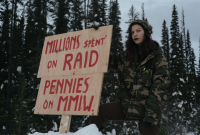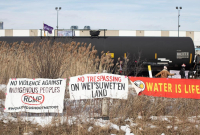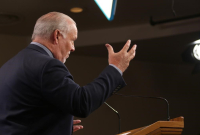Support strong Canadian climate journalism for 2025
As the global pandemic marches on, governments scramble to mitigate it and cobble together economic aid packages. Mass climate protests and the Wet'suwet'en solidarity blockades, just a few weeks ago, seem like a distant memory.
But there is one policy that could benefit Indigenous-settler relations, climate action and eventual economic recovery: Stop subsidizing fossil fuels and invest instead in a Green New Deal for a low-carbon economy, including a just transition for — and with — workers and communities in resource industries.
In the midst of a public health emergency, construction is continuing apace on the Coastal GasLink and Trans Mountain pipelines, and the federal government is contemplating a multibillion-dollar bailout for the oil and gas sector.
A dissertation by Prof. Sibo Chen at Ryerson University reviewed the public arguments, between 2011 and 2017, for and against massive development of B.C.'s LNG, 85 per cent of which derives from the extreme method of fracking.
Chen sees that project, the scope of which could rival the oilsands, as an example of the economic model of extractivism — the removal of non-renewable raw materials — for export to more advanced sectors of the global economy, with minimal returns, value-added processing or remediation of blasted landscapes for Canadians.
In Canada, extractivism has inherently involved the expropriation of, or intrusion upon, ancestral Indigenous territories. That's a legally and ethically fraught task, especially in lands that have not been ceded by treaty, and given the B.C. government's commitment, with all-party support, to the UN Declaration on the Rights of Indigenous Peoples.
From the start, the LNG pipe dream has been a social and environmental nightmare for northeastern B.C. For me, a 2019 "Voices from the Sacrifice Zone" panel organized by the Canadian Association of Physicians for the Environment was an eye-opener.
A Dawson Creek environmental scientist told us oil and gas is under-regulated compared to mining, where she worked for years. Fracking brings more earthquakes, pipeline explosions, air pollution, unstable dams and contamination of local water, birds and plants. A doctor spoke of increases in health problems — brain tumours, fibrosis, birth defects and lung cancer. A fifth-generation farmer described aggressive flaring that forced his family to abandon their house; unnatural changes in his herd (like a two-headed calf); precious farmland devoured by wells; a collective loss of hope, empowerment and community. A hereditary chief who lived for eight years in the Unist’ot'en camp detailed RCMP harassment while he was caring for and then burying his terminally ill mother.
All this, and also the hastened global warming from the greenhouse gas emissions in producing, transporting and consuming fracked gas. According to the Pembina Institute, while B.C. is legislatively committed to reducing CO2 emissions from 64 Mts to 39 Mts by 2030, LNG Canada alone will produce nine to 10 Mts annually. And there are the risks of increased tanker traffic in B.C.’s coastal waters; the unknown and unfunded costs of remediating abandoned wells; the further decline of Canada’s reputation as a climate leader; the potential threat to Canada’s own energy security through breakneck export of non-renewable resources; and the irony that B.C. subsidizes fracked gas byproducts for the diluents necessary for bitumen-bearing pipelines such as Trans Mountain, which Premier John Horgan’s government opposed.
LNG proponents realized they needed a green veneer to make fracked gas popularly acceptable. So they branded it a "bridge fuel" to help replace high-carbon coal while the world transitions to a carbon-neutral future. Dubious from the start, recent research demolishes that claim. "Fugitive" emissions of methane, a highly potent greenhouse gas, are much higher during natural gas production than previously assumed. The huge investment in fracking and pipeline infrastructure would lock B.C. into fossil fuel export for several decades while the world rapidly abandons fossil fuels, or slides into climate breakdown.
Does massive fracking and an LNG export pipeline at least make economic sense? Will it bring in government revenues, revitalized communities and "real" jobs?
For the political right a "real" job — a term popularized by Margaret Thatcher — is one that depends on success in the marketplace, rather than a salary in the public sector. For the left, real jobs are those a society agrees are necessary, and can provide a decent long-term livelihood for a family. These include "public goods," which can't be easily provided through the market. That's why we pay taxes to support nurses, teachers and firefighters, for example.
The oil and gas sector fails on both counts. It can't expand without huge public subsidies. The International Monetary Fund estimates Canada already subsidizes fossil fuels to the tune of $58 billion. After initial construction, the Coastal GasLink project provides relatively few permanent jobs — about 350 to 550, according to LNG Canada's own filings. Even before the pandemic, LNG prices in Asia tanked, and are likely to remain well below the cost of production and transport of B.C.'s fracked gas for the foreseeable future. Solar and wind power are becoming cheaper and more attractive to electricity producers globally.
And while nobody wants to turn off the taps tomorrow, there is no consensus that the expansion of fossil fuel infrastructure is socially necessary.
The LNG pipe dream, Chen reminds us, was originated not by the NDP, but by the B.C. Liberals under Christy Clark, searching for a "big picture" policy with electoral appeal. It worked. Bolstered by grandiose promises of prosperity and jobs, the Liberals won an unexpected victory in 2013.
Although B.C. NDP leaders never unequivocally opposed LNG, they strongly attacked the B.C. Liberals' taxpayer giveaways to their preferred Pacific Northwest LNG project. When in opposition in 2016, current Environment Minister George Heyman surely had it right: "We are creating significant environmental catastrophe, significant health issues and we are going to cost the economy of this province, this nation and the world billions of unnecessary dollars."
But now in office, to praise from corporate media pundits, Premier Horgan has embraced LNG Canada. Economist Marc Lee says that overall, the current B.C. government "has offered a much sweeter deal to the LNG industry than what the previous (Liberal) government was willing to extend." The sweeteners include discounted electricity prices, exemptions from increases in the B.C. carbon tax, a corporate income tax break and deferral of provincial sales tax on construction. Yet the likely contribution of LNG revenues to public coffers over 40 years "will not be huge."
And there is an alternative. Dawson Creek's Peace Energy co-op illustrates the shining potential of the renewable-energy sector in northeastern B.C., one that provides 7.5 times as many jobs for money invested, compared to oil and gas.
Why, then, has Horgan bought the pipe dream? Well-paying but relatively few jobs for construction unions? Ongoing lobbying from the oil and gas sector? An attempt to win NDP seats in rural B.C.? Perhaps all of the above. But above all, a failure of political imagination to pursue a post-extractivist future.
Chen warns of "progressive extractivism" — the use of progressive rhetoric, and the empty promise of financing a transition to a zero-carbon economy in some vague future, with equally uncertain profits from extractivist megaprojects. It's an approach as contradictory as dealing drugs to fund a rehab clinic. And it’s been debunked by academics like UBC’s Prof. Kathryn Harrison.
The Horgan government has hard-working MLAs and important progressive achievements — from affordable child care and housing to protecting free speech against corporate lawsuits. However, its legacy risks being overshadowed by fracking's risk to healthy economic development, B.C.'s own energy and food security, Indigenous rights and genuine climate action — all values needed to counteract current and future public health crises.
It's a dilemma for anti-extractivist progressives. Under our first-past-the-post electoral system, there are only two contenders in most B.C. ridings — the NDP and the even more exuberantly extractivist Liberals. Even with the balance of power in the B.C. legislature since 2017, the Green party has not been able to stop mega-LNG.
Inspired by debates within the federal NDP over fundamental issues such as Quebec self-determination and foreign ownership, I joined in 1971. The "Waffle" group's manifesto, "For an independent socialist Canada," promised to rejuvenate the party with 1960s movement energy. My first provincial convention (Kamloops, 1974), was a freewheeling affair. Rank-and-file activists vigorously critiqued the NDP's first premier, Dave Barrett, for perceived backpedalling on the party's platform.
Today's B.C. NDP is a more locked-down creature — its conventions more orchestrated, MLAs more heavily whipped and party members feeling like their assigned role is cheerleading and donating funds. There's not been much chance for internal debate on LNG policy, even within the caucus.
But before coronavirus took over politics and news, the RCMP raid on Wet’suwet’en territory and then the revelation of government complicity in it, were awakening the party's conscience. As early as last summer, three local riding associations submitted a motion to the November convention, calling for an end to the tax breaks, a moratorium on LNG development pending independent scientific and economic reviews, a task force with local voices to map more sustainable economic paths for northern B.C. and respect for UNDRIP and traditional Indigenous governance. Such an approach would have contributed both to climate action and avoided the raids and blockades. But the party's resolutions committee did not select this motion for debate. No wonder the party's recent fundraising from members has been, reportedly, sluggish.
As Yogi Berra supposedly said, "When you come to a fork in the road, take it."
As we ponder post-pandemic economic and social recovery, pouring tax money into LNG is not the right fork.









Comments
The dilemma for me is where to park my vote. The ‘exuberantly extractivist’ Liberals are out. The whipped NDP are out. The Greens can’t elect enough to be more than coalition partners. A split vote on the progressive side will elect the conservative side. Are we doomed?
wonderfully written , clearly lays out the dilemma and the way forward. understanding the situation at least gives us a chance to know how we should act. Will we?
Thank you for this informative opinion piece. I also attended the Forum "Voices from the Sacrifice Zone" in Victoria, BC last year. It was sobering (horrifying really!) to say the least. Why isn't this information getting out to the broader public? I know we need media coverage about Covid 19 in order to stay informed about the pandemic, but I worry that other important topics like Climate Change and resource extraction will be forgotten.
I would like to see a table showing, how much money from extraction ends up in who's pocket. Now and projected. It would be good to see the names of some individuals and corporations.
Welcome to the dilemma that led to the creation of the Courage Coalition, a national organization of federal NDP members and others. Exactly the same process has taken place in the federal party, and delegates to the convention in Edmonton decided on the need to work together to push the party back to it's roots. Some progress took place in Ottawa at the next convention.
With respect to which party to support, and besides the reality that electoral reform is increasingly desperately needed, more people are realizing the importance of remaining involved in politics between elections, and making sure their elected representatives are doing their jobs well.
Courage welcomes all who are willing to participate in this vital movement, so please visit the website and join! That's www.couragecoalition.ca
Thank you.